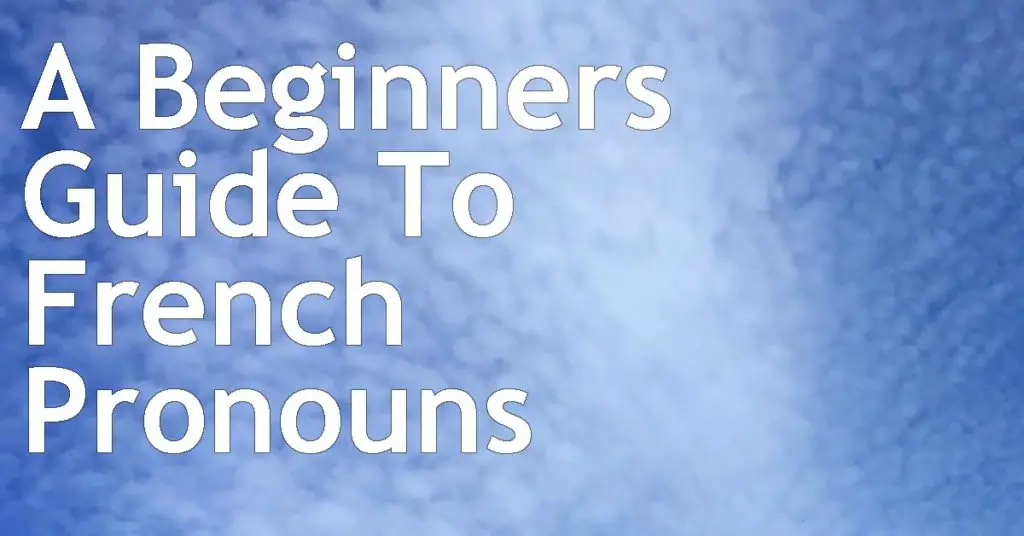The ‘Futur Simple’ is a French future tense used to describe an action that will happen at some point.
We use this tense when we want to talk about our future intensions “I will…”
Or predictions “he will…”
Or in sentences where there is an “if” condition – “if this happens, I will…”
Page Contents
The Future Tense In English
In English we say “I will speak”
We use the auxiliary “will” to help us understand that the verb “speak” is going to happen in the future.
In French there is not an auxiliary used. The verb itself is changed by giving it a slightly different ending which denotes that is referring to the future. Although there is no word for “will” when we translate it, this is what we understand it to mean.
How To Conjugate The Futur Simple In French
The future simple is very easy to conjugate.
For –ER and -IR verbs we just use the infinitive as they are (its basic form, we do not need to remove anything) and for –RE we pretty much do the same, but we remove the final -E.
We then add the following endings to the infinitive verb. All 3 verb groups use the same endings, so you have less to remember.
Example – Parler – To Speak
| Pronoun | Infinitive verb | Ending | |
| Je | Parler + | -ai | Je parlerai – I will speak |
| Tu | Parler + | -as | Tu parleras – You will speak |
| Il/Elle/On | Parler + | -a | Il/Elle parlera – He/She will speak |
| Nous | Parler + | -ons | Nous parlerons – We will speak |
| Vous | Parler + | -ez | Vouz parlerez – You will speak |
| Ils/Elles | Parler + | -ont | Ils/ells parleront – They will speak |
If you look carefully, the endings are actually something you may already know. They are the same as the irregular verb ‘Avoir’ in the present tense. Obviously Avoir has nothing to do with this, so don’t get confused, but it might help you remember the endings a little easier.
Irregulars Verbs In The Futur Simple In French
Of course the verbs that are irregular in other tenses are irregular in the futur simple.
Luckily they are pretty straight forward to form.
Each irregular verb has a stem and then you add the same endings as the regular verbs.
If we look at Avoir, its stem is “aur-” we then use this with every pronoun and add the same ending from the table above
- J’aurai – I will have
- Tu auras – You will have
- Il/Elle aura – He / She will have
- Nous aurons – We will have
- Vous aurez – You will have
- Ils/Elles auront – They will have
If we look at Être it is formed the same way. Its stem is “ser-” an as you can see the endings are the same as the regular verbs in the table above.
- Je serai – I will be
- Tu seras – You will be
- Il/Elle sera- He / She will be
- Nous serons – We will be
- Vous serez – You will be
- Ils/Elles seront – They will be
This means you only need to learn the stem for each irregular verb then and you can easily conjugate as needed.
There are a small handful of verbs where there are some small changes to the spelling of the infinitive, such as doubling of some letters.
For example jeter – to throw becomes “jetterai” where you can see it now has a double T.
It’s best to just double check the conjugation of a verb spelling to make sure there is no little changes like this, but the majority of the time you will not need to .
Negation In The Futur Simple
Negation is very straight forward in this tense and is the same as the present tense, where we place Ne …pas around the verb.
Je parlerai – I will speak
Je ne parlerai pas – I will not speak
Conclusion
The futur Simple is a very useful tense when you want to talk about your future intentions. A lot of the time you can use the Futur Proche (the near tense) to do this as well.
However, if something is going to happen in the future, not just “really soon”, we would use the futur simple.
We would also use the futur simple if we were in a more formally setting as its politer to say you “will” do something, rather than you are “going to” do something.
(Read the next lesson – Le Passé Récent – French Past Tense)

Ian is the owner and main writer of Reaching Fluency. He is a native English speaker, French speaker and Japanese learner and general lover of language learning.
You can read more about him on his Authors Page or link with him on social media
日常英会話メール
ニュースレターを購読してください! - 参加無料
メールリストに参加すると、少なくとも週に 1 回 (場合によってはそれ以上) メールが届きます
メールは毎日の英会話で、読んで勉強することができます。
メールは短いですが役に立ちます。いつでも停止できます


